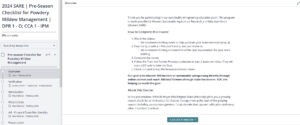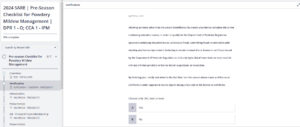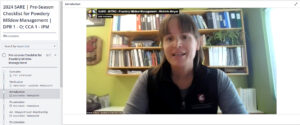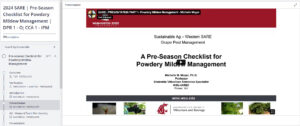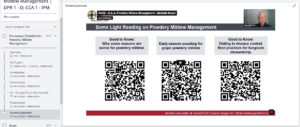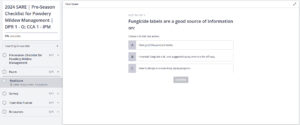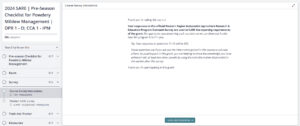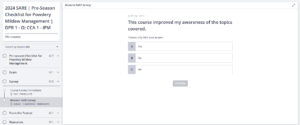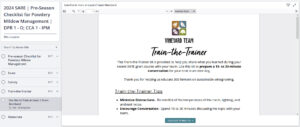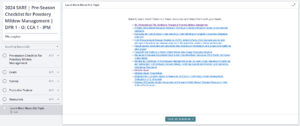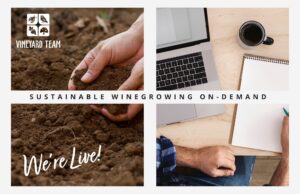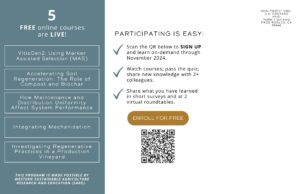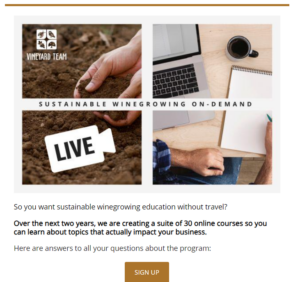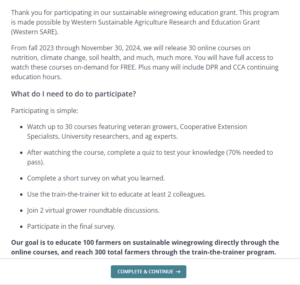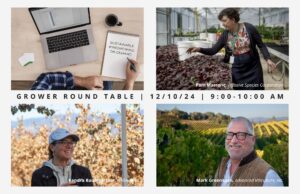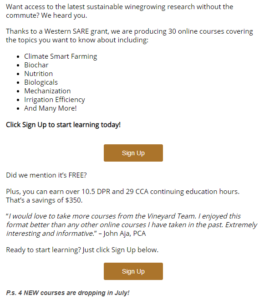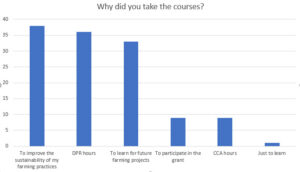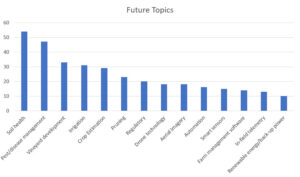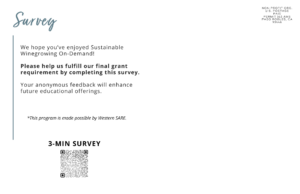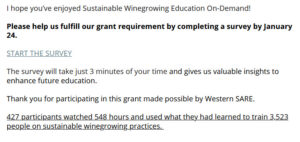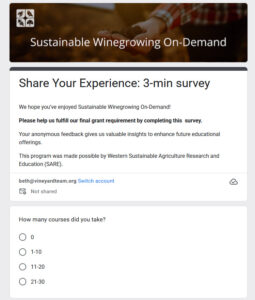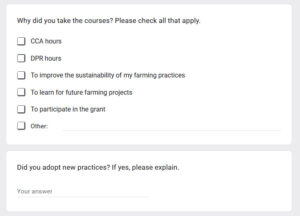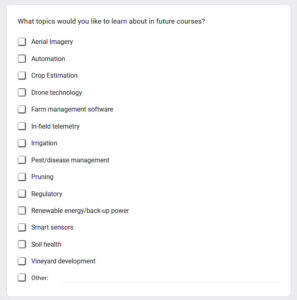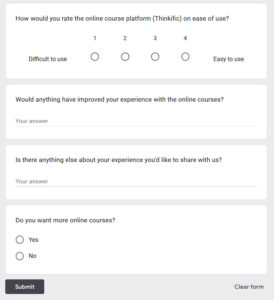Final report for WPDP23-001
Project Information
This project will produce 30 online courses that explore the latest sustainable viticulture practices over two years. Courses will be farmer and researcher driven to share science-based and practical farming methods. Veteran growers, Cooperative Extension Specialists, University researchers, and ag experts (e.g. USDA, CDFA) will cover the top challenges facing viticulturalists today including pests and diseases, water conservation, nutrient management, natural resource conservation, technology adoption, fruit quality, and regulatory compliance.
In-person continuing education events require travel, time away from the farm, financial investment (hotel, gas, food, ticket), and are not always available when the farmer is. A library of online courses gives more farmers access to sustainable viticulture education enabling them to learn about topics that actually impact their business.
Skills assessment and behavioral changes will be assessed throughout the project to expand and improve the educational experience in the future. Quizzes and surveys will determine the specific practices farmers learned and implemented. A train-the-trainer tool kit will help grower mangers facilitate educational programs for their own team.
Since 1994, Vineyard Team has shared the latest viticulture sustainable farming practices through field demonstrations, expert presentations, research, and grower-to-grower networking. Today, the organization can capitalize on its large network of growers and successful events to make educational content available to a wider audience. Online courses will be created by recording presentations at in-field “Tailgate” meetings and live sessions at the three-day Sustainable Ag Expo. Plus, new content will be developed by recording courses with online meeting platforms (Zoom) and video.
Ready access to online education helps grower managers educate their whole team to make smarter, sustainable vineyard management decisions to increase efficiency, conserve resources, and maximize fruit quality.
The target audience is viticulturalists in the Western United States as well as their field level staff, growers, and industry professionals who wish to gain knowledge on best practices.
Our objectives are:
1. To provide farming professionals with accessible educational opportunities to spread best management practices in the viticulture industry in a format that is convenient, easy to use, and timely.
2. Effectively educate a minimum of 100 grower managers on current viticulture sustainability topics. Engage participants through a direct mail and email campaigns using Vineyard Team’s 2500 person mailing list. Participating grower managers will share their course learnings with two team members, for a total project reach of a minimum of 300 farmers, so that they can further spread the knowledge to other industry members.
3. Assess knowledge gained with mandatory 70 percent passing grade course quizzes. Facilitate knowledge sharing with train the trainer tools kits and grower roundtables. And, determine behavioral change (implementation of sustainable viticulture practices) with surveys.
- April 2023 | Staff engages Board of Directors, Committees and hires a contractor to identify topics and experts (UC, university, grower) for the 2023 Sustainable Ag Expo (SAE) and 5 online presentations.
- May-July 2023 | Staff hires videographer to film 2 in-person/field meetings.
- June-July 2023 | Staff promotes courses in bi-weekly newsletter and mails postcard 1/4 to 2500 recipients.
- June-September 2023 | Staff films/edits/uploads/releases 5 presentations (including close captioning; quiz; survey).
- July-August 2023 | Staff edits/uploads/releases 2 online courses filmed at in-person/field meetings (including close captioning; quiz; survey).
- September 2023| Staff promotes courses in bi-weekly newsletter and mails postcard 2/4 to 2500 recipients.
- November 2023 | Film 15 SAE presentations on sustainable viticulture topics.
- December 2023 | Staff facilitates an online grower manager roundtable to discuss their learnings, newly implemented practices, and train-the-trainer experience.
- December 2023 - February 2024 | Staff edits/uploads/releases 15 SAE presentations (including close captioning; quiz; survey).
- February 2024 | Staff promotes courses in bi-weekly newsletter and mails postcard 3/4 to 2500 recipients.
- April 2024 | Staff and contractor plan 5 online presentations.
- May-July 2024 | Staff hires videographer to film 3 in-person/field meetings.
- July-August 2024 | Staff edits/uploads/releases 3 online courses filmed at in-person/field meetings (including close captioning; quiz; survey).
- July-September 2024 | Staff films/edits/uploads/releases 5 online presentations (including close captioning; quiz; survey).
- September 2024 | Staff promotes courses in bi-weekly newsletter and mails postcard 4/4 to 2500 recipients.
- December 2024 | Staff facilitates an online grower manager roundtable to discuss their learnings, newly implemented practices, and train-the-trainer experience.
- January 2025 | Staff sends producers a follow up survey to evaluate how many people were educated using train-the-trainer and what new practices were implemented at the vineyard.
- February-March 2025 | Staff evaluates survey data and aggregates responses to determine educational reach and sustainable practices implemented.
Cooperators
Education
This project will produce 30 online courses covering sustainable viticulture between April 2023 and March 2025 for growers primarily located in California. 100 grower Professionals will watch online courses. Course mastery will be measured with a quiz requiring a minimum 70% passing score. Course surveys (including the Western SARE format) will ask if the grower Professional learned new information, how and when they plan to educate their team, and what farm management changes they plan to make. Grower Professionals will use a train-the-trainer kit to educate at least two team members. Two virtual roundtables will allow farmers to discuss what they learned and experience share. A survey of behavioral changes in year two will confirm that grower managers shared their course learnings with their team using the provided tool kit and define changes were made to their farming practices.
Education & Outreach Initiatives
To provide farming professionals with accessible educational opportunities to spread best management practices in the viticulture industry in a format that is convenient, easy to use, and timely.
Develop and publish 30 courses between 2023 and 2024.
- Work with Vineyard Team's Outreach Committee, Board of Directors, and consultant Cliff Ohmart to identify experts and sustainable viticulture topics to film 5 total in-person "tailgate" meetings in 2023 and 2024, 10 virtual presentations in 2023 and 2024, and 15 in-person presentations at the November 2023 Sustainable Ag Expo.
-
Courses released in 2023 offered participants access to 1 DPR and 10 CCA continuing education hours:
- Accelerating Soil Regeneration: The Role of Compost and Biochar
- Biologicals Update and What is New for Biologicals in Vineyards
- Foliar Fertilizers in Vineyards
- How Maintenance and Distribution Uniformity Affect System Performance
- Integrating Mechanization
- Investigating Regenerative Practices in a Production Vineyard
- VitisGen2: Using Marker Assisted Selection (MAS)
- Courses released in 2024 included all 2023 releases and offered participants access to 11.5 DPR and 34 CCA continuing education hours:
- Areawide Management of Vine Mealybug and Leafroll VirusBest Management Practices for Weed Control in Vineyards
- Beyond Climate Change: The Agricultural Response and the Concept of Climate Smart Agriculture
- Biochar in the Vineyard
- Challenges in Achieving Adoption of the Latest in Vineyard Technology
- Climate Change and Sustainable Winegrape Growing
- Enhancing Biological Control of Mites and Mealybugs in Washington Vineyards Using a Drone and Attractants
- Fermented landscapes 101: Considering the micro(be) processes and macro consequences of socio-environmental transformation
- Fungicide Spraying: Reduce Your Carbon Footprint & Financial Burden
- Grape Phylloxera in Vineyards
- Improving Nursery Practices to Prevent Fungal Contamination and Biocontrol Strategies
- Against Grapevine Trunk Diseases
- Lodi Mealybug & Virus Management Evolution
- Making Sense of Sensors: The Future of Vineyard Disease Detection
- Myths, Misperceptions and Motivations for Precision Vineyard Management
- Pre-season Checklist for Powdery Mildew Management
- The Ins and Outs of Developing a New Vineyard Site
- The Spotted Lanternfly is coming to California!
- Trunk Renewal for Management of Trunk Diseases
- Turning Spatial Data into Management Decisions
- Using Hydrogels to Control Ants in Vineyards
- Vineyard Nutrition
- Vineyard Spraying Technologies to Improve Application Efficiency for Every Grower
- Waves of Innovation in Virus Vector Disruption: Vine Mealybug
-
- Schedule in-person and virtual recordings with experienced farmers, researchers, and UC extension staff.
- Ensure each course has an affiliated quiz to measure the grower's learnings.
- Include Western SARE survey to capture train-the-trainer numbers.
- Include a train-the-trainer kit model to be replicated in each online course.
- Apply for continuing education hours (DPR and CCA) for applicable courses.
- Publish courses on the online platform: Editing videos, formatting quizzes, SARE surveys, and denoting courses with continuing education.
Online Course Design
Below are screenshots showing the format for each online course. Courses with DPR hours included an additional Verification survey as required by DPR.
DPR and CCA approved continuing education hours have expiration dates. DPR at the end of the calendar year and CCA five years after approval. Online courses were closed on November 30, 2024 so that future course watchers will not take a course expecting DPR/CCA hours when they would no longer be valid.
All 30 courses are available for viewing through the Information Products section of this Western SARE report without continuing education hours.
Overview
Online Course DPR Verification
Online Course Introduction
Online Course Presentation
Online Course Review Questions
Online Course Final Exam
Online Course Survey Instructions
Online Course Survey
Online Course Train-the-Trainer
Online Course Resources
Benefits to Participants:
- Allows on-demand education from anywhere saving growers time and money on travel.
- Easy to use online platform.
- Tracks user progress.
- A quiz to test knowledge requires 70% passing grade with an option to retake.
- Western SARE survey is included to track learning.
- Certificates for DPR and CCA continuing education hours.
- Train the trainer tool kit makes educating members of the grower's team easy.
- Additional resources related to the topic are included in each course.
Effectively educate a minimum of 100 grower managers on current viticulture sustainability topics. Engage participants through direct mail and email campaigns using Vineyard Team’s 2500-person mailing list. Participating grower managers will share their course learnings with two team members, for a total project reach of a minimum of 300 farmers, so that they can further spread the knowledge to other industry members.
- Create an outreach plan including.
- Announce the grant and opportunity to participate for free.
- Develop a signup list to capture interested participants.
- Promote courses throughout the grant with new course announcements, continuing education hours, sneak peeks, and speaker bios through direct mail, email, and social media.
- Solicit 100 grower managers to participate in the grant project.
- Prompt participating growers to watch courses throughout the grant.
- Remind participating growers to share their knowledge with at least two team members using the train-the-trainer tool kit.
2023 Outcomes
- 233 registered participants
- 92 participants watched 7 courses and estimate they "will share some aspect of this project within the next 12 months" with 715 others
- 2,360 postcards mailed
- 2,711 email addresses reached
- 17 emails sent
- 100,000 impressions from press release
Media Examples
Postcard
Online Course
How to participate
2024 Outcomes
- 427 registered participants
- 120 participants who completed the Western SARE survey watched 30 courses (526 total views) and estimate they "will share some aspect of this project within the next 12 months" with 3,532 others
- 1,600 postcards mailed (grower roundtable reminder)
- 2,259 email addresses reached
- 18 emails sent
- 53 participants registered for the virtual grower roundtable
- 100,000 impressions from press release
Media Examples
Postcard
Assess knowledge gained with mandatory 70 percent passing grade course quizzes. Facilitate knowledge sharing with train-the-trainer tools kits and grower roundtables. And, determine behavioral change (implementation of sustainable viticulture practices) with surveys.
- Online course platform requires a >70% quiz passing grade. Students can retake the quiz.
- Facilitate two grower roundtables to discuss sustainable viticulture learning from the online courses.
- Review Western SARE survey results to assess knowledge gained, the number of people trained by participants, and to determine behavioral changes.
2023 Outcomes
- 71 quizzes passed with a >70% grade.
- 97% of survey respondents said YES to, "This course provided new knowledge."
- 77% of survey respondents said YES to, "This course modified my opinions and/or attitudes."
- 82% of survey respondents said YES to, "In the next year I am likely to use some aspect of this project to adopt one or more of the practices shown."
- 22 live attendees at the first Grower Roundtable (all participants can view the video).
- 11 continuing education hours (1 DPR and 10 CCA) offered.
2024 Outcomes
Since grant participants could be Producers or Professionals, each course included the Western SARE survey in its entirety. Responses varied slightly from the 2023 progress report however, some questions are similar. Below are survey responses from all released courses.
While there was a moderate 15% decrease in the percentage of participants who will "use some aspect of this project to adopt one or more of the practices shown" in the next year, 84% say the "course provided new skills".
Nearly all participants say the "course improved my awareness".
- 512 quizzes passed with a >70% grade.
- 96% of survey respondents said YES to, "This course improved my awareness."
- 94% of survey respondents said YES to, "This course provided new knowledge."
- 84% of survey respondents said YES to, "This course provided new skills."
- 78% of survey respondents said YES to, "This course modified my opinions and/or attitudes."
- 70% of survey respondents said YES to, "In the next year I am likely to use some aspect of this project to adopt one or more of the practices shown."
- 53 participants registered for the virtual grower roundtable (all participants can watch the recording)
- 45.5 continuing education hours (11.5 DPR and 34 CCA) offered.
2025 Outcomes
Because every online course already included the Western SARE survey, a new survey was crafted to access learning and implementation and also capture why courses were watched and what can be improved in the future. The 8 questions were approved by Western SARE before distribution.
The final survey was sent to the 400+ registered participants (not all grant participants remained subscribed to the email list). Of these, 120 had completed at least one Western SARE survey while watching the online courses. These participants are the grant's core audience.
Vineyard Team encouraged grant participants to complete the survey by sending one postcard and three email reminders.
Of the 64 who took courses and answered the final survey:
-
89% took 1-10 courses; Only 1 took 21-30
-
30% adopted new practices and 11% plan to (42% didn't answer this question)
-
Of those who answered, 51% adopted new practices and 19% plan to
- Note: This question was asked in a few ways through the Western SARE survey included in every online course. In 2024 70% of survey respondents said YES to, "In the next year I am likely to use some aspect of this project to adopt one or more of the practices shown."
-
-
Top 3 reasons for taking courses:
-
59% - Improve sustainability
-
56% - DPR hours
-
52% - To learn for future projects
-
-
94% want more courses
-
Top 3 future topics:
-
Soil health
-
Pest/disease management
-
Vineyard development
-
Media Examples
Postcard
Educational & Outreach Activities
Participation summary:
Learning Outcomes
Project Outcomes
2023 Outcomes and Impact
The goal of this grant is to educate 100 growers through a suite of 30 online courses addressing sustainable winegrowing topics. Since the first online courses were released on August 14, 2023, participation reached an impressive 233 participants and continues to grow.
Vineyard Team's has brought together experts and growers for 30 years to provide education on sustainable winegrowing. As a result of this longevity, the organization has a strong mailing list of 2k.
Course Development
A total of seven courses were released on time between August and the end of September. The remaining 23 courses will be released in 2024.
With grant funding secured in April 2023, the time required to identify topics, secure speakers, record presentations, edit video, apply for continuing education hours, and upload all content (video, quiz, survey, train-the-trainer, resources) in the Fall was realistic and achievable.
Recording some videos at in-person"Tailgate" meetings and others on Zoom gives variety to the suite of online courses.
Many Vineyard Team Members are already familiar with the online course platform, Thinkific. This created a smooth customer experience.
Grower Roundtable
The first Virtual Grower Roundtable was hosted on December 14, 2023. Vineyard Team staff reviewed the most watched courses and three invited speakers from each to join the meeting. Speakers included:
-
Doug Beck, Monterey Pacific | Accelerating Soil Regeneration: The Role of Compost and Biochar
-
Jenny Garley, New Age Laboratories | Investigating Regenerative Practices in a Production Vineyard
-
Lance Cadle-Davidson, ARS | VitisGen2: Using Marker Assisted Selection (MAS)
Each speaker gave a short overview of why their topic of expertise was important, what they are working on now, and what growers need to know or implement. Attendees used the Q&A tool to ask their specific questions directly to the experts.
2024 Communication Planning
A robust communication plan is prepared for 2024 to engage existing and new participants through email, direct mail, at in-person events, and on social media. With 23 new courses coming online, there is a lot of great content to share including new course releases, continuing education hours, speaker bios, and sneak peeks.
2024 Outcomes and Impact
Since the first online courses were released on August 14, 2023, the project exceeded its goal to educate 100 growers through a suite of 30 (526 total views) online courses. The grant had a total of 427 participants signed up to watch courses (120 completed Western SARE survey).
Course Development
All 30 of the planned courses were released between August 2023 and September 2024.
As mentioned in the 2023 Additional Outcome Narrative, Vineyard Team focused on developing courses that provide coveted Department of Pesticide Regulation (DPR) continuing hours. Many growers hold a license that requires earning a minimum number of education hours every two years.
In 2023, DPR made significant changes to the Sponsor (organizations like Vineyard Team that host educational meetings) application requirements including increasing quiz questions from five to 10, increasing minimum course time from 30 minutes to 60 minutes, and increasing application processing time from 30 days to 60 days.
Vineyard Team had already recorded several courses, including those filmed live at the November 2023 Sustainable Ag Expo, intended for release in 2024 before these changes were announced.
Despite the potential timeline setback, Vineyard Team released the remaining 23 courses by the beginning of August 2024.
Recording some videos at in-person "Tailgate" meetings and others on Zoom gave variety to the suite of online courses.
Vineyard Team has used the online course platform, Thinkific, for several years so grant participants were comfortable navigating the technology.
Grower Roundtable
The second Virtual Grower Roundtable was hosted on December 10, 2024. Vineyard Team staff reviewed the most watched courses and three invited speakers from each to join the meeting. Speakers included:
- Kendra Baumgartner, USDA-ARS | Trunk Renewal for Management of Trunk Diseases
- Mark Greenspan, Advanced Viticulture, Inc. | Vineyard Nutrition
- Carlos Bogran, BioWorks | Biologicials Update and What is New for Biologicals in Vineyards (stood in for Pam Marrone)
Each speaker gave a short overview of why their topic of expertise was important, what they are working on now, and what growers need to know or implement. Attendees used the Q&A tool to ask their specific questions directly to the experts.
2025 Communication Planning
In an effort to gather as many final survey responses as possible, a postcard will be mailed to participants in early January 2025. The grant application Timeline had planned for a promotional postcard to be sent in September 2024.
Already meeting the grant goal with 427 grant participants, Vineyard Team believes a postcard will have a bigger impact by encouraging survey participation.
Additionally, survey participants will receive 3 email reminders.
Survey questions aim to determine the value of online courses, what made them valuable, if new sustainable practices were implemented, and what participants want to earn in the future.
Survey results will be reviewed in February/March and results shared in the final report.
2025 Outcomes and Impact
The final survey (questions approved by Western SARE) was promoted with a postcard and through three emails to all participants.
Survey results are detailed in the Education & Outreach Initiatives Objective 3.
Final Survey Questions
2023
In planning the courses to be released in 2024, Vineyard Team focused on capturing a few courses that provide coveted Department of Pesticide Regulation (DPR) continuing hours. Many growers hold a license that requires earning a minimum number of education hours every two years.
Recently DPR made significant changes to the Sponsor (organizations like Vineyard Team that host educational meetings) application requirements. These include increasing quiz questions from five to 10, increasing minimum course time from 30 minutes to 60 minutes, and increasing application processing time from 30 days to 60 days.
Vineyard Team had already recorded a number of courses, including those filmed live at the November 2023 Sustainable Ag Expo, intended for release in 2024 before these changes were announced.
While all recorded course content will bring high value to grant participants, staff would still like to provide as many DPR hours as possible. The new DPR application and extended processing time may delay the release of 5-10 courses until July 2024. Grant participants will get great value out of the opportunity to receive DPR hours online.
Vineyard Team has other courses that are eligible for CCA hours that will still be released by the end of February 2024 to provide participants with access to education earlier in the year.
2024
It is challenging to find industry-specific, good-quality DPR hours. One major achievement of this grant was the production of 11 courses offering a total of 11.5 DPR hours.
Out of the 30 courses, the ones offering DPR hours were the top 11 most watched. This is a valuable insight into the demand for courses that help growers maintain their licenses.
|
Course Name |
# Enrollees |
|
2024 SARE | Trunk Renewal for Management of Trunk Diseases | DPR 1 - O; CCA 1 - IPM |
48 |
|
2024 SARE | Lodi Mealybug and Virus Management Evolution | DPR 1 - O; CCA 1 - IPM |
48 |
|
2024 SARE | The Spotted Lanternfly is coming to California! | DPR 1 - O; CCA 1 - IPM |
46 |
|
2024 SARE | Pre-Season Checklist for Powdery Mildew Management | DPR 1 - O; CCA 1 - IPM |
45 |
|
2024 SARE | Biologicals Update and What is New for Biologicals in Vineyards | DPR 1.5 - O; CCA 1 - IPM |
44 |
|
2024 SARE | Using Hydrogels to Control Ants in Vineyards | DPR 1 - O; CCA 1 - IPM |
43 |
|
2024 SARE | Grape Phylloxera in Vineyards | DPR 1 - O; CCA 1 - IPM |
37 |
|
2024 SARE | Waves of Innovation in Virus Vector Disruption: Vine Mealybug | DPR 1 - O; CCA 1 - IPM |
37 |
|
2024 SARE | Vineyard Spraying Technologies to Improve Application Efficiency for Every Grower | DPR 1 - O; CCA 1 - PA |
29 |
|
2024 SARE | Improving Nursery Practices to Prevent Fungal Contamination and Biocontrol Strategies Against Grapevine Trunk Diseases | DPR 1 - O; CCA 1 - IPM |
23 |
|
2024 SARE | Making Sense of Sensors: The Future of Vineyard Disease Detection | DPR 1 - O; CCA 1-CM |
15 |
|
2024 SARE | Best Management Practices for Weed Control in Vineyards | CCA 0.5 - IPM |
14 |
|
2024 SARE | The Ins & Outs of Developing a New Vineyard Site | CCA 2 - S |
10 |
|
2023 SARE | Foliar Fertilizers in Vineyards | CCA 1 - NM |
10 |
|
2024 SARE | Vineyard Nutrition | CCA 1 - NM |
10 |
|
2024 SARE | Biochar in the Vineyard | CCA 2 - SWM |
9 |
|
2024 SARE | Enhancing Biological Control of Mites and Mealybugs in Washington Vineyards Using a Drone and Attractants | CCA .5 - IPM |
8 |
|
2024 SARE | Fungicide Spraying: Reduce Your Carbon Footprint & Financial Burden | CCA 2 - IPM |
7 |
|
2024 SARE | Climate Change and Sustainable Winegrape Growing | CCA 1 - S |
6 |
|
2024 SARE | Turning Spatial Data into Management Decisions | CCA 1 - PA |
6 |
|
2024 SARE | Areawide Management of Vine Mealybug and Leafroll Virus | CCA 2 - IPM |
6 |
|
2023 SARE | Accelerating Soil Regeneration: The Role of Compost and Biochar | CCA 1.5 - SWM |
5 |
|
2024 SARE | Myths, Misperceptions and Motivations for Precision Vineyard Management | CCA 1 - PA |
5 |
|
2024 SARE | Fermented Landscapes 101: Considering the Micro(be) Processes and Macro Consequences of Socio-Environmental Transformation |
4 |
|
2024 SARE | Beyond Climate Change: The Agricultural Response and the Concept of Climate Smart Agriculture | CCA 1 - SWM |
4 |
|
2023 SARE | Investigating Regenerative Practices in a Production Vineyard | CCA 2 - SWM |
3 |
|
2024 SARE | Challenges in Achieving Adoption of the Latest in Vineyard Technology | CCA 1 - CM |
2 |
|
2023 SARE | How Maintenance and Distribution Uniformity Affect System Performance | CCA 1.5 - SWM |
1 |
|
2023 SARE | VitisGen2: Using Marker Assisted Selection (MAS) | CCA 1 - CM |
1 |
|
2023 SARE | Integrating Mechanization | CCA 2 - CM |
1 |
2025
Grant Highlights
- 30 online courses garnered 526 total views
- 427 participants signed up (100 was the grant goal) and 120 completed the Western SARE survey
- 2 live virtual grower roundtables
- 70% of 2024 Western SARE survey respondents said YES to, "In the next year I am likely to use some aspect of this project to adopt one or more of the practices shown."
- 94% of final survey respondents want more courses
- Top 3 reasons for taking courses:
- 59% - Improve sustainability
- 56% - DPR hours
- 52% - To learn for future projects
2023 Course Surveys
The original goal of the grant was to educate 100 participants directly through online courses and have each participant educate 2 colleagues on what they learned. The target audience is winegrape growers primarily located in California.
The majority of survey respondents described how they will implement what they learned from the courses at their operation:
- "We're going to start by checking the quality of compost we buy and spread. Where wind's an issue, we're going to look at mixing it into the middle of the row. "
- "Using a testing block this year we will be testing biologicals and comparing them to conventional methods to see if it is better to switch going forward."
- "To help young and incoming people in this industry."
Survey responses reveal that the grant has reached beyond the state of California and is impacting a larger audience than originally targeted.
- Four participants indicated that they would use the knowledge that they gained from one or more courses to educate 50-100 others.
- A Pennsylvania grower plans to work with a county Conservation District office, Ag extension office, Penn State, and regional businesses to promote the use of biochar/compost. "This on-Farm production practice will be a game-changer for practices in our local area, the region, and hopefully the state"
- One participant said she would use the course information as she designs, "course lectures for a local ag school".
- Farming education is important to share with customers too to battle food-disconnect. One participant said, "We host customer vineyard tours and will be able to convey this info in this type of setting."
2023 Grower Round Table Survey
A survey was sent after the first Grower Roundtable in 2023. Respondents had this to say about their experience in the grant program:
- "I have found the presentations to be very informative and well thought out." Winegrape Farmer
- "The quality of the content and the flexibility of the online platform are awesome. Super interesting and useful; easy to access." Winegrape Farmer, Paso Robles, California
2024 Course Surveys
The original goal of the grant was to educate 100 participants directly through online courses and have each participant educate 2 colleagues on what they learned. The target audience is winegrape growers primarily located in California.
The majority of survey respondents described how they will implement what they learned from the courses at their operation:
-
“I will use the information to talk to the farm owners about the information out there related to biochar use in vineyards.”
-
“I have already added Predalure to my list of thing to buy for spring, and look forward to using predatory insects in order to reduce pesticide usage”
-
“We will train our field team to help with pest identification and foster a feeling of investment and ownership of the vineyards.”
-
“I am considering regrafting some of the vineyard in the next few years. the conversation around clones was very helpful.”
-
“I'm going to talk to our Ag Commissioner about it so we can work on Public Works managing its Tree of Heaven infestation.”
Survey responses reveal that the grant has reached students and other crops, impacting a larger audience than originally targeted.
-
"I will be attending UC Merced as a PhD student this fall working with the new Carpophilus beetle and plan on using biologicals to create an ipm toolkit for the pest."
-
"I will implement more understanding and use on my blueberry farm (re biologicals)"
-
"I am a student in the Master of Wine program. I will incorporate this information with essays and responses regarding sustainable viticulture and general pest control topics."
2025 Final Survey
In addition to asking about implementation of new practices, the Final Survey asked what participants liked and would like to improve about their overall experience.
There was a lot of positive feedback including:
- "The educational value was great!"
- "These courses are fantastic."
- "It was very easy for me to put on the 2024 SARE talks to listen to on my commute, then take the tests when I was ready. I appreciated how relevant the topics are, they helped update me on current research that directly impacts my work. It was a pleasant and valuable way to earn my CE hours, and would highly recommend to others."
Of the 16 responses to "Is there anything else about your experience you'd like to share with us?" and "Would anything have improved your experience with the online courses?", 6 included frustration over course functionality (Q&A, fast-forward, click to next segment) which are mandatory to receive DPR/CCA continuing hours. We understand these features are in place to ensure participant engagement with the content.
VT staff is evaluating the course format/instructions to clarify which functions are required by DPR/CCA. The final survey shows that DPR hours are a top reason for watching online courses. Communication with growers about mandatory online course formatting will manage expectations.
6 respondents appreciated/wanted more DPR hours:
- "As farmers, we appreciate the material being made available to us, especially for DPR approved hours."
- "I learned a lot and appreciate the quiz at the end. It certainly made me pay extra attention to the details."
There is a great opportunity to provide more high-quality online courses with continuing education hours. On-demand education gives farmers the opportunity to learn at their own pace from anywhere. This grant was instrumental in funding the production of 30 online courses.
Maintaining the product into the future does incur additional costs including course software (Thinkific and Vimeo), mandatory annual DPR license application fees, staff time to apply for DPR hours, pull reports and submit DPR hours bi-weekly, providing tech support for participants, and communications to promote the availability of the courses, ensure participants have their license number captured, etc.
Vineyard Team is exploring ways to fund the above activities so the program can be financially sustainable.
